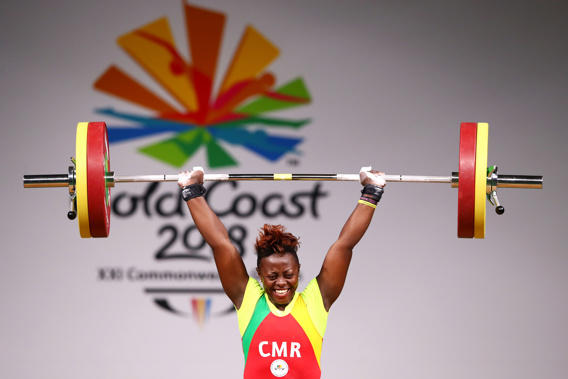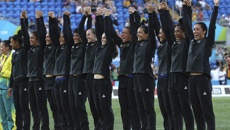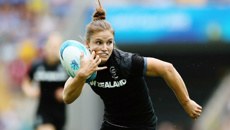
A group of African athletes who went on the run during the Commonwealth Games on the Gold Coast have turned up in Sydney seeking legal advice on how to stay in Australia.
The sportsmen and women are consulting with the Refugee Advice and Casework Service in Randwick, in the city's eastern suburbs, The Daily Telegraph revealed.
They have until Tuesday at midnight until their visas run out and will face detention or deportation unless they have a new application in progress.
Up to 19 athletes disappeared during the Games last month, including a third of the Cameroonian team, sparking a nationwide search. Others hailed from Uganda, Rwanda and Sierra Leone.
Their teammates flew home after their competitions without the missing group.
A handful of officials also did a disappearing act: like Rwanda's weightlifting coach, who excused himself to go to the toilet before his team competed — and never came back.
Now it appears some of them are in Sydney, making efforts to find a legal way to stay in Australia.
Officials said they walked out of the athletes' village in "three waves" in the middle of the night, and did not seem likely to return.
The Cameroon team's press attache Simon Molombe said he had "no idea" where the athletes were heading. "They just left in the night," he said.
"When we got up in the morning, they were not there. It's very, very disappointing and very, very embarrassing for Cameroon.
He told news.com.au he "doesn't think they'll come back".
Home Affairs Minister Peter Dutton — who is expected to comment on the athletes' reappearance today — warned: "If they don't want to be held in detention or locked up at the local watch house, they'd better jump on a plane before the 15th (of May)."
Cameroon's chef de mission — having heard nothing from the eight missing members of his 24-strong team — said the matter was now in the hands of police and the Australian Government. Victor Agbor Nso told the BBC "the authorities are very disappointed with the deserters — some did not even compete".
While police have not yet been looking for the athletes because they still have valid visas, Mr Nso said the Cameroon team had filed an official complaint.
Cameroonian weightlifters Olivier Matam, Arcangeline Fouodji Sonkbou and Mikoumba Petit David and boxers Ndzie Tchoyi and Simplice Fotsala, Fokou Arsene, Christelle Ndiang and Yombo Ulrich are among those missing.
A Rwandan athlete, two squash players from Sierra Leone and two athletes from Uganda later also disappeared.
In 2006, at Melbourne's Commonwealth Games, more than 40 athletes or officials either overstayed, or sought asylum. The Sydney 2000 Olympics and London 2012 Olympics were also hit by stories of athletes overstaying their visas, with some applying for asylum.
Ian Natherson, a migration consultant based on the Gold Coast, said he received more than 40 calls during the 2018 Commonwealth Games — mostly from African team members — looking for legal ways to stay in Australia afterwards.
"Just walking down the street [here] the freedom you have — you cannot do that in a lot of African countries," he told the ABC.
"I come from South Africa myself, where I would not walk the streets after dark.
"I am sure a lot of them did do that here and just thoroughly enjoyed the freedom."
Gold Coast 2018 organising corporation chairman Peter Beattie stressed the athletes remain within their visas and are free to travel within Australia.
However, the situation has been deemed serious enough for Border Force to be contacted.
Mr Beattie said it was up to the Cameroon team to monitor the situation up until the point the athletes break the conditions of the visas. "It happens at every Games. It's not a surprise," he said.
"I don't want to be too blase, but I don't get too excited about this because I know there is a system to deal with it."
Commonwealth Games Federation chief executive David Grevemberg stressed the athletes remained guests in Australia until midnight on May 15. "It's obviously disappointing that some of the athletes who've come didn't compete as they were scheduled to compete," he said.
"These athletes are guests here in Australia at this time. They're still within their visas. They have the right to travel freely, but this is obviously an issue that team Cameroon is monitoring closely and until it becomes a real issue in terms of visas and so forth we would obviously have to take that very seriously."
Gaining asylum depends on being able to convince authorities there is a threat to your life if you return to your home country. But the athletes may be eligible for special skills visas to allow them to live in Australia and compete professionally.
For some, the risk of emerging from hiding and being sent home may be judged too great, and they may choose to stay under the radar, with no legal documents, living as best they can through menial jobs.
Take your Radio, Podcasts and Music with you









